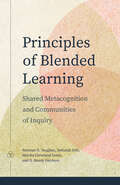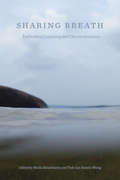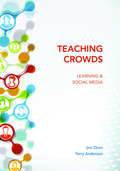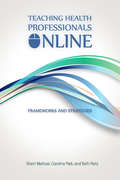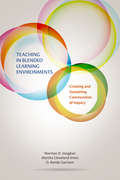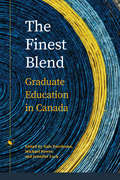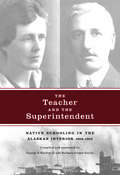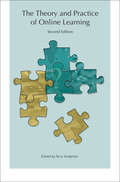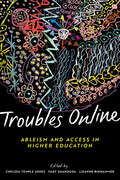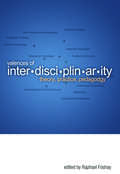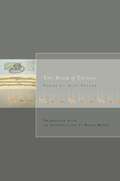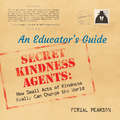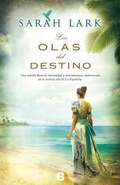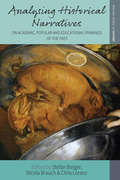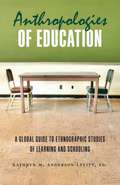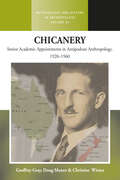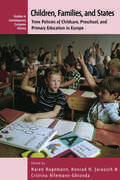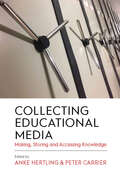- Table View
- List View
Principles of Blended Learning: Shared Metacognition and Communities of Inquiry (Issues in Distance Education)
by D. Randy Garrison Norman D. Vaughan Martha Cleveland-Innes Deborah DellThe rapid migration to remote instruction during the Covid-19 pandemic has expedited the need for more research, expertise, and practical guidelines for online and blended learning. A theoretical grounding of approaches and practices is imperative to support blended learning and sustain change across multiple levels in education organizations, from leadership to classroom. The Community of Inquiry is a valuable framework that regards higher education as both a collaborative and individually constructivist learning experience. The framework considers the interdependent elements of social, cognitive, and teaching presence to create a meaningful learning experience. In this volume, the authors further explore and refine the blended learning principles presented in their first book, Teaching in Blended Learning Environments: Creating and Sustaining Communities of Inquiry, with an added focus on designing, facilitating, and directing collaborative blended learning environments by emphasizing the concept of shared metacognition.
Sharing Breath: Embodied Learning and Decolonization
by Sheila Batacharya Yuk-Lin Renita WongTreating bodies as more than discursive in social research can feel out of place in academia. As a result, embodiment studies remain on the outside of academic knowledge construction and critical scholarship. However, embodiment scholars suggest that investigations into the profound division created by privileging the mind-intellect over the body-spirit are integral to the project of decolonization. The field of embodiment theorizes bodies as knowledgeable in ways that include but are not solely cognitive. The contributors to this collection suggest developing embodied ways of teaching, learning, and knowing through embodied experiences such as yoga, mindfulness, illness, and trauma. Although the contributors challenge Western educational frameworks from within and beyond academic settings, they also acknowledge and draw attention to the incommensurability between decolonization and aspects of social justice projects in education. By addressing this tension ethically and deliberately, the contributors engage thoughtfully with decolonization and make a substantial, and sometimes unsettling, contribution to critical studies in education.
Teaching Crowds: Learning and Social Media
by Terry Anderson Jon DronWithin the rapidly expanding field of educational technology, learners and educators must confront a seemingly overwhelming selection of tools designed to deliver and facilitate both online and blended learning. Many of these tools assume that learning is configured and delivered in closed contexts, through learning management systems (LMS). However, while traditional "classroom" learning is by no means obsolete, networked learning is in the ascendant. A foundational method in online and blended education, as well as the most common means of informal and self-directed learning, networked learning is rapidly becoming the dominant mode of teaching as well as learning. In Teaching Crowds, Dron and Anderson introduce a new model for understanding and exploiting the pedagogical potential of Web-based technologies, one that rests on connections — on networks and collectives — rather than on separations. Recognizing that online learning both demands and affords new models of teaching and learning, the authors show how learners can engage with social media platforms to create an unbounded field of emergent connections. These connections empower learners, allowing them to draw from one another’s expertise to formulate and fulfill their own educational goals. In an increasingly networked world, developing such skills will, they argue, better prepare students to become self-directed, lifelong learners.
Teaching Health Professionals Online: Frameworks and Strategies
by Beth Perry Sherri Melrose Caroline ParkTeaching Health Professionals Online: Frameworks and Strategies is a must-read for professionals in the health care field who strive to deliver excellence in their online classes. Intended for a wide range of professionals, including nurses, social workers, occupational and radiation therapists, chiropractors, dietitians, and dental hygienists, this compendium of teaching strategies will inspire both new and experienced instructors in the health professions. In addition to outlining creative, challenging activities with step-by-step directions and explanations of why they work, each chapter in the text situates practice within the context of contemporary educational theories such as instructional immediacy, invitational theory, constructivism, connectivism, transformative learning, and quantum learning theory. Melrose, Park, and Perry also address other issues familiar to those who have taught online courses. How can a distance instructor build teacher-student relationships? How does one transform the assumptions often held by students in the health fields from the confines of the virtual classroom? Most importantly, how can the instructor support his or her students in their future pursuits of knowledge and their development as competent professionals? By considering these and other concerns, this handbook aims to help instructors increase student success and satisfaction, which, the authors hope, will ultimately produce the best possible patient care.
Teaching in Blended Learning Environments: Creating and Sustaining Communities of Inquiry
by D. Randy Garrison Norman D. Vaughan Martha Cleveland-InnesTeaching in Blended Leaning Environments provides a coherent framework in which to explore the transformative concept of blended learning. Blended learning can be defined as the organic integration of thoughtfully selected and complementary face-to-face and online approaches and technologies. A direct result of the transformative innovation of virtual communication and online learning communities, blended learning environments have created new ways for teachers and students to engage, interact, and collaborate. The authors argue that this new learning environment necessitates significant role adjustments for instructors and generates a need to understand the aspects of teaching presence required of deep and meaningful learning outcomes. Built upon the theoretical framework of the Community of Inquiry – the premise that higher education is both a collaborative and individually constructivist learning experience – the authors present seven principles that provide a valuable set of tools for harnessing the opportunities for teaching and learning available through technology. Focusing on teaching practices related to the design, facilitation, direction and assessment of blended learning experiences, Teaching in Blended Learning Environments addresses the growing demand for improved teaching in higher education.
The Finest Blend: Graduate Education in Canada (Issues in Distance Education)
by Gale Parchoma, Michael Power, and Jennifer LockAs Canadian universities work to increase access to graduate education, many are adopting blended modes of delivery for courses and programs. Within this changing landscape of higher education, The Finest Blend answers the call for rigorous research into these methods to ensure quality learning and teaching experience and presents case studies of French and English universities across Canada that are experimenting with blended learning models in graduate programs. Drawing on various research methods, the contributors to the volume investigate the sustainability of blended learning, shifts in pedagogical practices, and the role of instructional designers. They share key practices for both graduate students and instructors and emphasize the importance of institutional and departmental support for both students and faculty transitioning to blended delivery modes. Touching on theory, design, delivery, facilitation, administration, and evaluation, this book provides a comprehensive overview of current practices and opportunities for blended learning success. With contributions by Alicia Adlington, Shaily Bhola, Denise Carew, Jane Costello, Daph Crane, Jane Hanson, Michael Fairbrother, Wendy Kraglund-Gauthier, Shehzad Ghani, Michele Jacobsen, Carol Johnson, Sawsen Lakhal, Yang (Flora) Liu, Dorothea Nelson, Pam Phillips, Marlon Simmons, Kathy Snow, Maurice Taylor, and Jay Wilson.
The Teacher and the Superintendent: Native Schooling in the Alaskan Interior, 1904-1918
by Barbara Grigor-Taylor George E. Boulter IIFrom its inception in 1885, the Alaska School Service was charged with the assimilation of Alaskan Native children into mainstream American values and ways of life. Working in the missions and schools along the Yukon River were George E. Boulter and Alice Green, his future wife. Boulter, a Londoner originally drawn to the Klondike, had begun teaching in 1905 and by 1910 had been promoted to superintendent of schools for the Upper Yukon District. In 1907, Green left a comfortable family life in New Orleans to answer the “call to serve” in the Episcopal mission boarding schools for Native children at Anvik and Nenana, where she occupied the position of government teacher. As school superintendent, Boulter wrote frequently to his superiors in Seattle and Washington, DC, to discuss numerous administrative matters and to report on problems and conditions overall.From 1906 to 1918, Green kept a personal journal—hitherto in private possession—in which she reflected on her professional duties and her domestic life in Alaska. Collected in The Teacher and the Superintendent are Boulter’s letters and Green’s diary. Together, their vivid, first- hand impressions bespeak the earnest but paternalistic beliefs of those who lived and worked in immensely isolated regions, seeking to bring Christianity and “civilized” values to the Native children in their care. Beyond shedding private light on the missionary spirit, however, Boulter and Green have also left us an invaluable account of the daily conflicts that occurred between church and government and of the many injustices suffered by the Native population in the face of the misguided efforts of both institutions..
The Theory and Practice of Online Learning
by Terry AndersonIn this important collection of essays by practitioners and scholars that has been downloaded nearly half a million times is an overview of some of the most pressing issues in online education. By addressing transformations arising from educational technology advances and the new business conditions and modes of delivery of education, the contributors to The Theory and Practice of Online Learning provide insights into this complex, diverse, and rapidly evolving field.
Troubles Online: Critical Approaches to Accessible Teaching and Learning
by Chelsea Temple Jones Fady Shanouda Lisanne BinhammerOnline education is often heralded as a solution for accessibility to higher education; however, ableism thrives online. In this timely collection, contributors aim to trouble what online teaching looks like and think critically about how disability is addressed in online classrooms. Through narratives, poetry, interviews, and scholarly analysis, they reflect on disabled, mad, sick, and crip online pedagogy and highlight the possibilities of expanding critical standards for accessible teaching and learning. Necessarily interdisciplinary, this collection retheorizes the classroom around a justice-based approach to online pedagogy and challenges the assumptions we have around universal design. Refusing to position access as an afterthought, this collection troubles our engagement with online accessibility in uncertain and evolving times.
Valences of Interdisciplinarity: Theory, Practice, Pedagogy
by Raphael FoshayThe modern university can trace its roots to Kant's call for enlightened self-determination, with education aiming to produce an informed and responsible body of citizens. As the university evolved, specialized areas of investigation emerged, enabling ever more precise research and increasingly nuanced arguments. In recent decades, however, challenges to the hegemony of disciplines have arisen, partly in response to a perceived need for the university to focus greater energy on its public vocation—teaching and the dissemination of knowledge. Valences of Interdisciplinarity presents essays by an international array of scholars committed to enhancing our understanding of the theoretical underpinnings and the practical realities of interdisciplinary teaching and research. What is, and what should be, motivating our reflections on (and practice of) approaches that transcend the conventional boundaries of discipline? And in adopting such transdisciplinary approaches, how do we safeguard critical methods and academic rigour? Reflecting on the obstacles they have encountered both as thinkers and as educators, the authors map out innovative new directions for the interdisciplinary project. Together, the essays promise to set the standards of the debate about interdisciplinarity for years to come.
The Book of Things (Lannan Translations Selection Series #18)
by Ales StegerFrom his first book of poems, Chessboards of Hours (1995), Aleš Šteger has been one of Slovenia's most promising poets. The philosophical and lyrical sophistication of his poems, along with his work as a leading book editor and festival organizer, quickly spread Šteger's reputation beyond the borders of Slovenia. The Book of Things is Šteger's most widely praised book of poetry and his first American collection. The book consists of fifty poems that look at "things" (i.e. aspirin, chair, cork) which are transformed by Šteger's unique poetic alchemy.Translator Brian Henry is a distinguished poet, translator, editor, and critic.From Publisher’s Weekly:Steger’s efforts sometimes bring to mind such Western European figures as Francis Ponge and Craig Raine, who also sought to make household things look new and strange. Yet Steger brings a melancholy Central European sense of history- his objects tend to remember, or cause, great pain: "It pours, this poisonous, sweet force,” Steger writes of "Saliva,” "Between teeth, when you spit your own little genocide.” (Nov.)From Guernica, a Magazine of Art and Politics:It is a rare treat to have an English translation before the ink has dried on the original. By which I mean, a mere five years after the book’s Slovenian publication, Brian Henry has brought these poems to life for those of us not lucky enough to read Slovenian. Henry’s translations are impressive for sheer acrobatics.
Circuser Meye (সার্কাসের মেয়ে)
by Ypsa Writersএই বইয়ের গল্পটি বেশ প্রাণবন্ত এবং আকর্ষণীয়। এখানে বিনোদনের মাধ্যমে শিক্ষণীয় বিষয়গুলো তুলে ধরা হয়েছে। এ ছাড়া কিশোর, পরিবারের সদস্য, মাতা-পিতা, শিক্ষক, সমাজের গণ্যমান্য ব্যক্তিবর্গ এবং স্বাস্থ্যকর্মীসহ অন্য সকলে যারা বিষয়টির সাথে জড়িত তাদের জন্যও বেশ কিছু তথ্য এতে রয়েছে। একজন মানুষকে জীবনে অনেকগুলো ধাপ পার হতে হয়। ১০ থেকে ১৯ বছর বয়সের মধ্যে কিশোর-কিশোরীরা শারীরিক ও মানসিকভাবে বড় হয় এবং তাদের মধ্যে ব্যাপক পরিবর্তন আসে। এ সময়ে তারা খুব কৌতূহলী ও চঞ্চল থাকে। তবে শারীরিক পরিবর্তন, মানসিক চাপ ও দুঃশ্চিতা কাটিয়ে ওঠাসহ বিভিন্ন ধরনের আবেগ প্রবণতা ও সামাজিক সমস্য কিভাবে সমাধান করা যায় তা শেখার এটাই সঠিক সময়।
Nirapod Matritta
by Ypsa Writersএকজন প্রসূতি মা কিভাবে নিরাপদে সন্তান প্রসব করবে ও পরিচর্চা করবে এবং ১-৩ বছরের শিশুকে কিভাবে সেবা, যত্ন ও লালন পালন করবে তার গাইড লাইন।
Peer Education Aid to Sexual and Reproductive Health Rights for Young People
by Ypsa Writersযৌন ও প্রজনন স্বাস্থ্য একটি স্পর্শকাতর বিষয়, যা বড়রা সহজে তাদের বয়সী ছোট যারা, তাদের সাথে আলোচনা করতে পারেনা এবং স্বাচ্ছন্দ্যবোধ করেনা। কিন্তু বিষয়গুলি কিশোর-কিশোরী/যুবক-যুবতীর জানা একান্ত প্রয়োজনীয়, কেননা আমাদের দেশের শিক্ষা প্রতিষ্ঠানগুলোতে এই ধরনের শিক্ষা পদ্ধতি চালু নেই। পিয়ার এডুকেশন এমন একটি পদ্ধতি, যেখানে কিশোর-কিশোরী/যুবক-যুবতীরা সহজেই তাদের বন্ধু-বান্ধবীদের সাথে তাদের মনের কথাগুলো বলতে পারে। পিয়ার এডুকেশন অধিবেশন পদ্ধতিতে যৌন ও প্রজনন স্বাস্থ্য বিষয়ক তথ্য পিয়ার এডুকেটরের মাধ্যমে জানতে পারে এবং নিজেদের মধ্যে আলোচনার মাধ্যমে নিজেদের দক্ষতা বাড়াতে পারে।
Las olas del destino: Serie Jamaica V. II
by Susana Andrés Font Sarah LarkIsla de Jamaica, 1753. Deirdre, la hija de la inglesa Nora Fortnam y del esclavo Akwasi, lleva una vida protegida en la plantación de su madre y de su padre adoptivo. Pese a los orígenes poco claros de la joven, los muchachos de la isla beben los vientos por ella. Deirdre, sin embargo, no siente el menor interés por ninguno de ellos hasta que el joven médico Victor Dufresne pide su mano. Tras una espléndida ceremonia nupcial, la pareja de recién casados zarpa hacia Saint-Domingue, en La Española. Los sucesos que allí acontecerán transformarán sus vidas por completo… «Como era la primera vez que navegaba, Deirdre observó llena de emoción que el barco zarpaba y se dirigía a alta mar mientras la orilla de Jamaica se iba haciendo más diminuta hasta desaparecer en el horizonte. Victor la había rodeado con el brazo para consolarla, pero para Deirdre era más fuerte el ansia de aventura que la pena por la despedida. Pasó el día en cubierta y celebró la presencia de los delfines que acompañaban la embarcación. -Delante de La Española también verás ballenas -anunció Victor-. Van para celebrar la boda. Por fortuna son pacíficas. En caso contrario habría que tenerles miedo, son casi tan grandes como nuestro barco. -¡Qué bonito que todos celebren las bodas! -exclamó Deirdre riendo-. Ay, Victor, desde que estoy contigo tengo la impresión de que toda mi vida es una gran fiesta.»
Porque te quiero: Educar con amor y mucho más
by Carlos Goñi Zubieta Pilar Guembe MañeruTodos los padres quieren a sus hijos, pero no todos saben quererlos. Hay que saber administrar el amor: amar con cabeza, que no significa quererlos menos, sino al contrario, supone un plus afectivo por nuestra parte. En esta tarea no se puede ir con tiento sino que hay que derrochar cariño por los cuatro costados, pero sin malgastarlo, o lo que es lo mismo, sin gastarlo mal.Malgastar el amor que damos a nuestros hijos significa no invertirlo adecuadamente, canjearlo por un activo atractivo pero ineficaz. Quererlos es fácil, lo hacemos de forma natural, pero lo que ellos necesitan es que se les quiera bien, que se invierta ese capital inmenso en una cuenta a largo plazo que reporte los intereses no en los padres sino en los hijos.El libro de Pilar y Carlos da muchas pistas para afrontar los pequeños retos cotidianos tan decisivos en la educación de los hijos. Estructurado en cuatro partes (Porque quiero que seas independiente, Porque quiero que seas capaz, Porque quiero que seas tú, Porque quiero que seas feliz), aporta ideas muy prácticas para que los padres no caigamos en errores tan inconscientes como habituales (Situaciones a evitar).Pilar y Carlos (Pamplona, 1963) están casados y son padres de Adrián y Paula. Llevan más de 20 años dedicados a la enseñanza, durante los cuales han acumulado mucha experiencia tanto en el trato con padres como con alumnos. Pilar es pedagoga y trabaja como profesora y orientadora. Carlos es doctor en filosofía y escritor. Juntos imparten conferencias y asesoran en temas educativos. Escriben artículos en diferentes medios y son autores de No se lo digas a mis padres y No me ralles, donde afrontan los conflictos más comunes entre los adolescentes. En este libro se centran en la etapa más decisiva en la educación de los hijos (desde los 0 a los 12 años). Quieren motivar a los padres a educar con amor y mucho más?
Programa Taldeka para la convivencia escolar
by Luis De la Herrán GascónEste programa de convivencia escolar pretende ser un material de referencia flexible y adaptable a la realidad de cada centro educativo. El Taldeka (agrupados) de Luis de la Herrán Gascón, es un programa integrador e integral. Las familias, el profesorado y el personal no docente son parte indispensable para propiciar una convivencia escolar en armonía.El diálogo, la comunicación efectiva, la participación democrática, el aprendizaje experiencial y la inteligencia emocional son los valores que soportan las actividades y experiencias que proponemos. Desde las herramientas que nos ofrece la gestión alternativa de conflictos, como la mediación, el world café o los diálogos apreciativos, se presentan actividades creativas de prevención e intervención en conflictos, algunas tan arriesgadas como efectivas.Los cuestionarios Taldeka de evaluación nos ayudarán a conocer, antes y después de la puesta en marcha de las actividades, la opinión de los protagonistas sobre la situación actual de cada centro. El profesorado encontrará en este libro ideas sugerentes, el alumnado actividades que mejorarán sus lazos de unión, las familias propuestas innovadoras; y el personal no docente y de servicios, su voz y su voto en la convivencia escolar hasta ahora negada.Luis de la Herrán Gascón psicólogo por la Universidad de Deusto, especialista en Psicología Clínica. Máster en terapia de conducta, trabaja como psicólogo clínico desde 1997 en el Centro Delta Psicología. Es miembro de la Comisión de Psicología Clínica y de la Salud del Colegio Oficial de Psicólogos de Bizkaia, terapeuta acreditado por la Asociación Española de Psicología conductual y miembro de la Sociedad Española para el avance de la psicología clínica y de la salud. Mediador en empresas y organizaciones. Máster en mediación y gestión de conflictos por la Universidad Autónoma de Barcelona. Director técnico en Zubika Mediación S. Coop. Pequeña.
Sita's Story
by Jacqueline Suthren HirstSeries Editor: Professor Julius Lipner, The Divinity School, University of Cambridge "Sita" is an ideal, an inspiration, an icon. Aimed primarily at high school students, this book may surprise many adults with its balanced, contemporary interpretation from one of the greatest cultural epics of all time, the Ramayana. This is the first volume in 'INDIC VALUES SERIES' published in collaboration with the Divinity School, Cambridge University.
Analysing Historical Narratives: On Academic, Popular and Educational Framings of the Past (Making Sense of History #40)
by Chris Lorenz Stefan Berger, Nicola BrauchFor all of the recent debates over the methods and theoretical underpinnings of the historical profession, scholars and laypeople alike still frequently think of history in terms of storytelling. Accordingly, historians and theorists have devoted much attention to how historical narratives work, illuminating the ways they can bind together events, shape an argument and lend support to ideology. From ancient Greece to modern-day bestsellers, the studies gathered here offer a wide-ranging analysis of the textual strategies used by historians. They show how in spite of the pursuit of truth and objectivity, the ways in which historians tell their stories are inevitably conditioned by their discursive contexts.
Analysing Historical Narratives: On Academic, Popular and Educational Framings of the Past (Making Sense of History #40)
by Chris Lorenz Stefan Berger, Nicola BrauchFor all of the recent debates over the methods and theoretical underpinnings of the historical profession, scholars and laypeople alike still frequently think of history in terms of storytelling. Accordingly, historians and theorists have devoted much attention to how historical narratives work, illuminating the ways they can bind together events, shape an argument and lend support to ideology. From ancient Greece to modern-day bestsellers, the studies gathered here offer a wide-ranging analysis of the textual strategies used by historians. They show how in spite of the pursuit of truth and objectivity, the ways in which historians tell their stories are inevitably conditioned by their discursive contexts.
Anthropologies Of Education
by Kathryn M.Despite international congresses and international journals, anthropologies of education differ significantly around the world. Linguistic barriers constrain the flow of ideas, which results in a vast amount of research on educational anthropology that is not published in English or is difficult for international readers to find. This volume responds to the call to attend to educational research outside the United States and to break out of "metropolitan provincialism." A guide to the anthropologies and ethnographies of learning and schooling published in German, French, Spanish, Portuguese, Italian, Slavic languages, Japanese, and English as a second language, show how scholars in Latin America, Japan, and elsewhere adapt European, American, and other approaches to create new traditions. As the contributors show, educators draw on different foundational research and different theoretical discussions. Thus, this global survey raises new questions and casts a new light on what has become a too-familiar discipline in the United States.
Chicanery: Senior Academic Appointments in Antipodean Anthropology, 1920–1960 (Methodology & History in Anthropology #44)
by Geoffrey Gray Doug Munro Christine WinterAcademic appointments can bring forth unexpected and unforeseen contests and tensions, cause humiliation and embarrassment for unsuccessful applicants and reveal unexpected allies and enemies. It is also a time when harsh assessments can be made about colleagues’ intellectual abilities and their capacity as a scholar and fieldworker. The assessors’ reports were often disturbingly personal, laying bare their likes and dislikes that could determine the futures of peers and colleagues. Chicanery deals with how the founding Chairs at Sydney, the Australian National University, Auckland and Western Australia dealt with this process, and includes accounts of the appointments of famous anthropologists such as Raymond Firth and Alexander Ratcliffe-Brown.
Children, Families, and States: Time Policies of Childcare, Preschool, and Primary Education in Europe (Contemporary European History #8)
by Konrad H. Jarausch Karen Hagemann Cristina Allemann-GhiondaDue to the demand for flexible working hours and employees who are available around the clock, the time patterns of childcare and schooling have increasingly become a political issue. Comparing the development of different “time policies” of half-day and all-day provisions in a variety of Eastern and Western European countries since the end of World War II, this innovative volume brings together internationally known experts from the fields of comparative education, history, and the social and political sciences, and makes a significant contribution to this new interdisciplinary field of comparative study.
Collecting Educational Media: Making, Storing and Accessing Knowledge
by Peter Carrier Anke HertlingOver the last two centuries, collectors from around the world have historicized, politicized, and digitized media in the pursuit of knowledge and education. This collected volume explores collections of educational media and their bearing on the ways in which people learn in both the present and future, how and why material objects have been used worldwide to store and maintain knowledge for politically expedient reasons, and how our understanding of digital collections can be adequately understood only in relation to, and as an extension and adaptation of, the historically contingent material collections from which they emerged.
